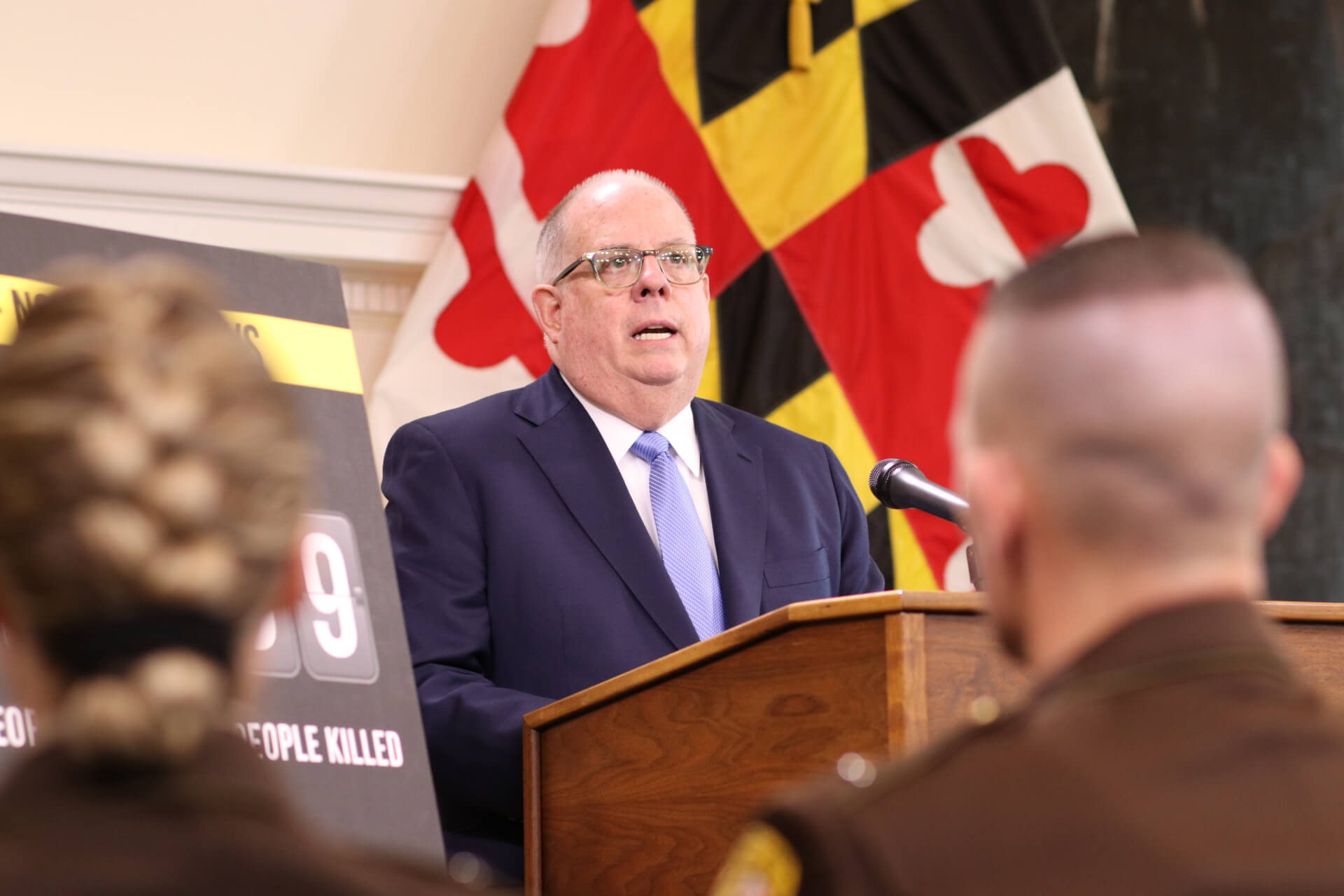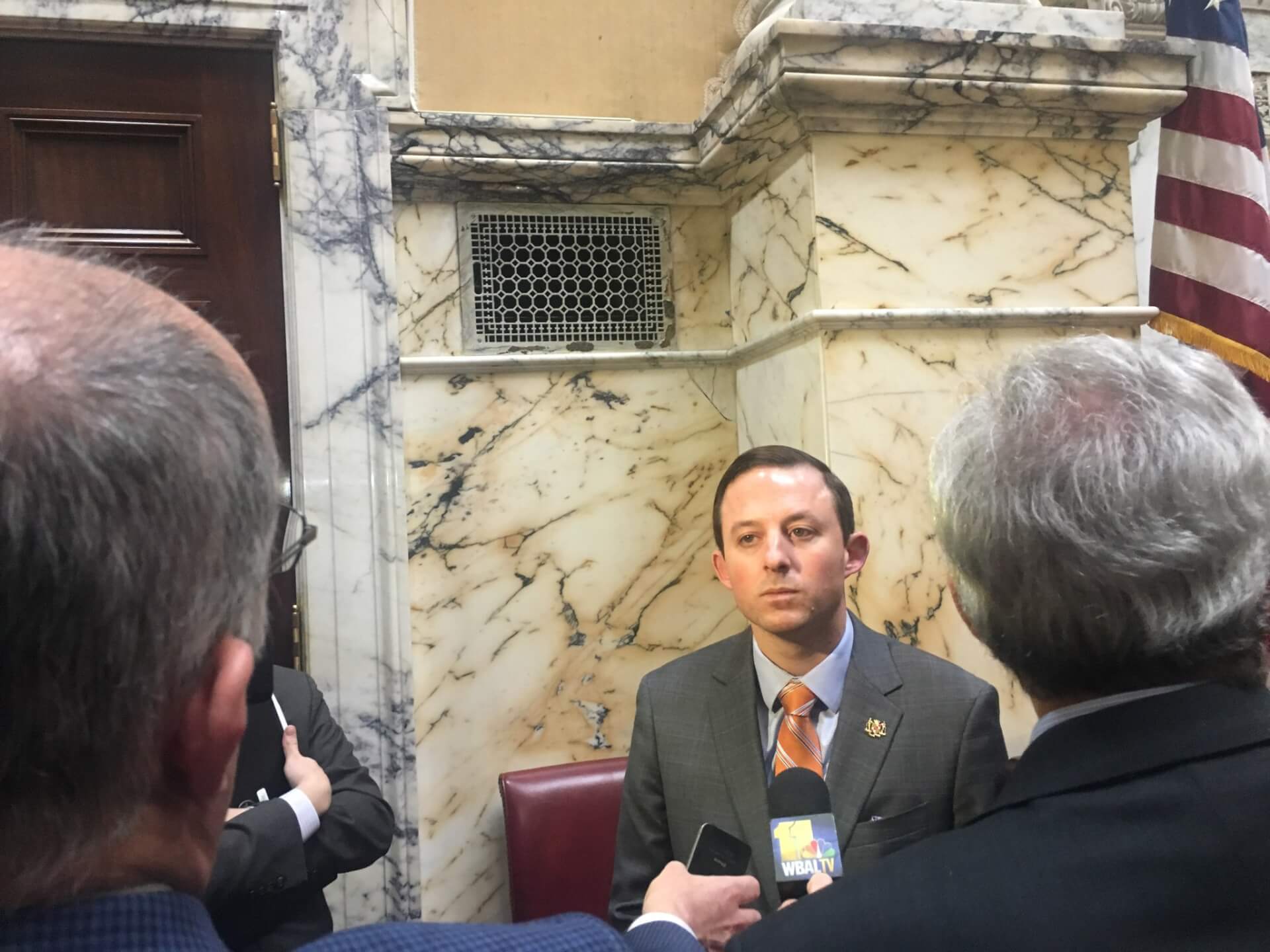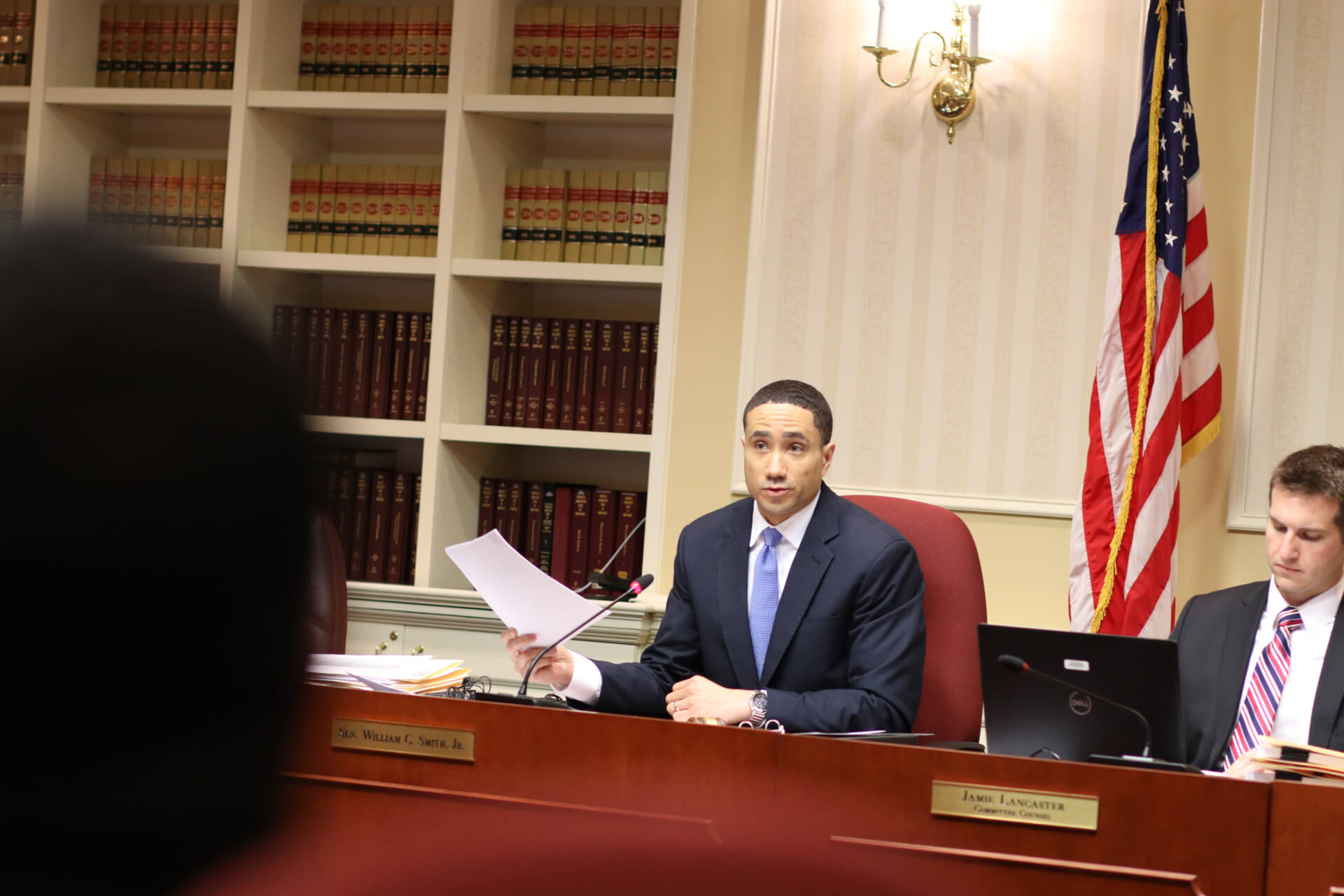Hogan, Legislature in Open Warfare Over Crime, Taxes and Communication

Gov. Lawrence J. Hogan Jr. (R) launched a blistering attack on Democratic lawmakers Thursday, accusing them of blocking vital anti-crime legislation for political purposes and suggesting that a proposal from House leaders to fund a major education reform plan could ruin the Maryland economy.
Hogan’s message, delivered in a heated midday State House news conference and through radio interviews, newspaper reports and social media, came as lawmakers resist his top proposals to address violent crime in Baltimore, which he labeled “THE most important priority of the people of Maryland.”
Hogan’s criticisms — which included a call for the new chairman of the Senate Judicial Proceedings Committee to resign — set off an extraordinary day of charges and counter-charges between the chief executive and the legislature, with key lawmakers accusing him of political grandstanding and hyperbole.
Hogan, whose political operation conducts polls frequently, repeatedly cited survey data to accuse Democrats of subverting the will of the people on his crime proposals.
“The public is literally crying out, pleading with the legislature to take these actions,” Hogan asserted during his news conference — which was attended by two dozen Republican state lawmakers.
The governor said there have been 104 shootings in Baltimore City since the legislative session began on Jan. 8 — an indirect implication that lawmakers are to blame.
Specifically, Hogan is trying to whip up support for three crime bills that the legislature has resisted so far:
— The Violent Firearm Offenders Act, which would significantly increase penalties for criminal offenses committed with guns. Hogan said that 85% of Marylanders and 85% of Baltimore City residents support the measure.
— The Judicial Transparency Act, which would create a database of the criminal sentences handed down by judges. Hogan said 85% of Marylanders and 93% of Baltimore City residents support the legislation.
— The Witness Intimidation Prevention Act, which toughens penalties for witness intimidation. Hogan said 91% of Marylanders and 97% of Baltimore City residents support the measure.
“I don’t believe there have ever been bills before the legislature that have ever had more enthusiastic, nearly unanimous support,” Hogan said.
The governor added that he was declaring his three bills “emergency legislation,” to ensure expedited consideration in the legislature and that they would go into effect immediately if passed.
But he can’t do that: Traditionally, the governor’s legislation is introduced by the General Assembly’s presiding officers as a courtesy. While those bills can be amended during the committee process and made into emergency legislation, Hogan can’t unilaterally decree them as such. He did, however, send a letter to the Judicial Proceedings Committee Thursday, requesting the designation.
In an interview with The Baltimore Sun published Thursday, Hogan offered particularly barbed criticism of Senate Judicial Proceedings Chairman William C. Smith Jr. (D-Montgomery), who took over the committee in January after serving for nine months as a U.S. Naval reservist in Afghanistan. Smith has said he opposes Hogan’s violent offenders bill because it would impose mandatory minimum sentences for certain crimes, which he does not believe are effective.
Smith’s colleagues leapt to his defense on Thursday.

Senate President Bill Ferguson (D-Baltimore City) talks to reporters after Gov. Lawrence J. Hogan Jr. (R) criticized the legislature for not moving his anti-crime bills. Photo by Hannah Gaskill
“I think everybody is frustrated by the state of violence, and everybody has an urgency,” said Senate President Bill Ferguson (D-Baltimore City). “What I think we need to avoid is making it personal, about a process or a member of leadership. Sen. Smith was serving in Afghanistan all of last year when we had a record number of homicides. He was defending our country. I think it’s inappropriate to suggest that the senator should not serve as the chair of an important committee.”
Interviewed immediately after the Senate floor session, Smith accused Hogan of being “reckless and intellectually dishonest” in the way he is framing the debate about violent crime in Baltimore.
Smith further sought to address the governor’s criticisms at the beginning of the Judicial Proceedings hearing on Thursday afternoon. He said draconian strategies of the past haven’t worked to reduce crime and that mandatory minimums “destroyed and decimated generations of Marylanders, most of whom are black and brown.”
If the governor wants to pursue a policy that requires mandatory minimums, Smith said he and others want data to support the theory.
“If this is such a priority, and if he has data to support implementing new mandatory minimums, then please come down to this committee and give it to us, present it to us. And then we can wrestle with an intellectually honest conversation.”
Smith added, “The governor has got to start leading and stop polling.”
Sen. Robert Cassilly (R-Harford), a member of Judicial Proceedings, defended Hogan. He said that while he doesn’t support the call for Smith’s resignation, he does understand the governor’s frustration with crime in Baltimore and that his bills haven’t moved forward.
“We’re moving late into the session and we do need to ramp up the effort and really put these bills first ― certainly above the balloon bills and the like,” he said. “Some of these measures have got to come first on the docket.”
‘I invite him to pick up the phone’
As legislative leaders pushed back on Hogan’s criticisms, a recurring theme was that while the governor is effective at using his bully pulpit to lob criticisms their way, he rarely invests the time to lobby them directly on behalf of his priorities.
Smith and Ferguson urged Hogan to consider testifying at a Judicial Proceedings Committee hearing to discuss his legislation and other anti-crime measures under consideration this legislative session.
On Thursday, the Judicial Proceedings panel held hearings on bills from Smith that would establish a law enforcement coordinating council in the state, which would, among other things, create a comprehensive statewide crime strategy, and another that would establish a state-led warrant apprehension task force. At his news conference, Hogan called them “two do-nothing pieces of legislation masquerading as crime bills.” The governor said his administration is already operating programs to accomplish the goals of both bills.

Senate Judicial Proceedings Chairman William C. Smith Jr. (D-Montgomery) addresses remarks from Republican Gov. Lawrence J. Hogan Jr. about his committee’s work on crime bills. Photo by Danielle E. Gaines.
Yet in almost the same breath, Hogan said he had “a nice, long personal discussion” with Smith at a breakfast he hosted for the Legislative Black Caucus on Thursday morning. He declined to divulge the details.
Asked if he would considering appearing before Smith’s committee, Hogan noted that governors rarely testify before the legislature and added, “You can send him my testimony,” referring to his remarks at the news conference.
The Maryland Democratic Party responded by noting that Hogan’s predecessor, former Gov. Martin J. O’Malley (D), testified before the legislature on marriage equality, rescinding the death penalty, offshore wind energy, septic pollution and aquaculture.
Sen. Jill P. Carter (D-Baltimore City), a member of the Judicial Proceedings panel, also faulted Hogan for failing to reach out to the legislature more.
“If we’re serious about dealing with crime in Baltimore and other places, I think a starting place would have been to consult with the six senators that represent Baltimore City, who were not consulted before the legislation was drafted,” she said.
Later Thursday, House Speaker Adrienne A. Jones (D-Baltimore County) offered a withering assessment of Hogan’s policies and tactics.
“We cannot just add more criminal laws on the books if the ones we have aren’t being used effectively,” she said in a statement. “We cannot arrest our way out of this problem.
“I have not met with the Governor once since the legislative session began. If he has an urgent concern about his bills, I invite him to pick up the phone or talk to me directly.”
‘It’s not going to happen as long as I’m governor’
Just as lawmakers criticized Hogan for not communicating with them adequately, the governor at his news conference said he was taken completely by surprise by a proposal from House Democratic leaders, floated Wednesday night, to lower the state sales by a penny tax but to expand it to include most services, which currently aren’t taxed.
Hogan said the sales tax expansion proposal from House Majority Leader Eric G. Luedtke (D-Montgomery) ― and cosponsored by the chairs of the Appropriations, Economic Matters and Ways and Means committees ― proved what he’d been warning all summer: that Democrats would introduce a tax hike on the scale of billions of dollars to pay for the Blueprint for Maryland’s Future, an ambitious education reform proposal.
“I’ve been saying for at least six months almost every day that the legislature was going to propose billions of dollars in new taxes to pay for this Kirwan program,” he said. “And they all continued to say no, we’re not going to propose billions in new taxes. I specifically said they were going to raise the sales tax, and they swore that they were not going to raise the sales tax. This is a $2.6 billion per year increase in the sales tax. It is a tax on working families. It is a tax on single moms.”
Luedtke said he doesn’t think his proposal runs afoul of leadership promises to avoid tax hikes in the state’s income, property or sales taxes.
“Leadership said they wouldn’t increase the rate in [the] property, income and sales [taxes]. This decreases the rate in the sales tax,” he said. “I don’t think it goes against the general thrust [of our earlier pledge], but it is another option.”
The Democrats’ proposal gave Hogan a fresh opportunity to remind people that O’Malley raised state taxes and fees 43 times, including a $600 million increase in the sales tax.
“When he did that, he became the least popular governor in all 50 states in America,” Hogan said, adding that the tax hike “crushed our economy.”
Hogan again cited polling, suggesting that only 2% of Marylanders support tax increases. He became animated, wagging his finger as he spoke.
“This one tax measure is higher than all 43 tax increases that Gov. O’Malley enacted put together,” he said. “It’s not going to happen as long as I’m governor.”
Bruce DePuyt and Hannah Gaskill contributed to this report.





 Creative Commons Attribution
Creative Commons Attribution